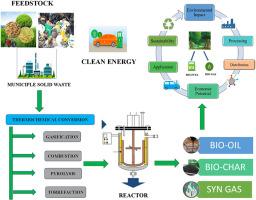Advancement of thermochemical conversion and the potential of biomasses for production of clean energy: A review
IF 16.3
1区 工程技术
Q1 ENERGY & FUELS
引用次数: 0
Abstract
This study delves into the promising realm of clean energy production through thermochemical conversion and chemical advancements. As the global demand for sustainable energy intensifies, exploring innovative technologies becomes imperative. The focus here is on harnessing the potential of thermochemical conversion, coupled with advancements in chemical processes. This dual approach holds significant promises for generating clean energy. The abstract underscores the critical role of these technologies in meeting escalating energy needs while shedding light on the advancements, challenges, and opportunities that pave the way for their successful implementation. Waste biomass represents an excellent bioresource that can be harnessed to produce numerous types of energy carriers, including bio-oil, bio-crude oil, biodiesel, syngas, biochar, and hydrogen. This article reviews the potential of various types of biomasses, including food waste, agricultural and forestry biomass, energy crops & oilseed crops, municipal solid waste, and animal manure, and also discusses the different types of reactors. In this review, comprehensively discusses all thermochemical methods for bio-oil production, including pyrolysis, gasification, and liquefaction. Each method is examined in detail, highlighting their respective processes, advantages, and challenges. Additionally, various types of reactors used in these methods are analyzed, emphasizing their roles and efficiencies in optimizing bio-oil yield and quality. Therefore, this review article will help in understanding the potentiality of waste biomasses for the production of clean energy via thermochemical techniques.

热化学转化的进步和生物质生产清洁能源的潜力:综述
本研究深入探讨了通过热化学转换和化学进步生产清洁能源这一前景广阔的领域。随着全球对可持续能源需求的增加,探索创新技术已势在必行。本研究的重点是利用热化学转换的潜力,并结合化学工艺的进步。这种双管齐下的方法有望产生清洁能源。摘要强调了这些技术在满足日益增长的能源需求方面的关键作用,同时阐明了为成功实施这些技术铺平道路的进步、挑战和机遇。废弃生物质是一种极好的生物资源,可用于生产多种类型的能源载体,包括生物油、生物原油、生物柴油、合成气、生物炭和氢气。本文回顾了各类生物质的潜力,包括食物垃圾、农业和林业生物质、能源作物& 油籽作物、城市固体废弃物和动物粪便,还讨论了不同类型的反应器。本综述全面讨论了生物油生产的所有热化学方法,包括热解、气化和液化。对每种方法都进行了详细研究,强调了它们各自的工艺、优势和挑战。此外,还分析了这些方法中使用的各类反应器,强调了它们在优化生物油产量和质量方面的作用和效率。因此,这篇综述文章将有助于了解废弃生物质通过热化学技术生产清洁能源的潜力。
本文章由计算机程序翻译,如有差异,请以英文原文为准。
求助全文
约1分钟内获得全文
求助全文
来源期刊

Renewable and Sustainable Energy Reviews
工程技术-能源与燃料
CiteScore
31.20
自引率
5.70%
发文量
1055
审稿时长
62 days
期刊介绍:
The mission of Renewable and Sustainable Energy Reviews is to disseminate the most compelling and pertinent critical insights in renewable and sustainable energy, fostering collaboration among the research community, private sector, and policy and decision makers. The journal aims to exchange challenges, solutions, innovative concepts, and technologies, contributing to sustainable development, the transition to a low-carbon future, and the attainment of emissions targets outlined by the United Nations Framework Convention on Climate Change.
Renewable and Sustainable Energy Reviews publishes a diverse range of content, including review papers, original research, case studies, and analyses of new technologies, all featuring a substantial review component such as critique, comparison, or analysis. Introducing a distinctive paper type, Expert Insights, the journal presents commissioned mini-reviews authored by field leaders, addressing topics of significant interest. Case studies undergo consideration only if they showcase the work's applicability to other regions or contribute valuable insights to the broader field of renewable and sustainable energy. Notably, a bibliographic or literature review lacking critical analysis is deemed unsuitable for publication.
 求助内容:
求助内容: 应助结果提醒方式:
应助结果提醒方式:


